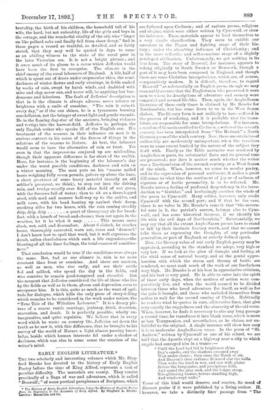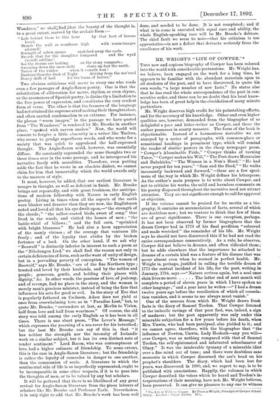EARLY ENGLISH LITERATURE.*
THE two scholarly and interesting volumes which Mr. Stop- ford Brooke has devoted to the history of Early English Poetry before the time of King Alfred, represent a task of peculiar difficulty. The materials are scanty. They consist practically of a Saga of war and adventure, which is called "Beowulf ; " of some poetical paraphrases of Scripture, which * The History of Early English Eiterattere, being the History of English Poetry from its Beginning to the Accession of King Alfred. By Btopford A. Brooke. London: Macmillan and Co.
are fathered upon Cmdmon ; and of various poems, religions and elegiac, which were either written by Cynewulf, or show his influence. These materials appear to lend themselves to a very simple classification. They seem to exhibit our ancestors in the Pagan and fighting stage of their his-
tory; under the absorbing influence of Christianity; and in the more reflective and self-conscious stage of a slightly developed civilisation. Unfortunately, we get nothing in its first form. The story of Beowulf, for instance, appears to belong originally to South Sweden or Denmark, though a
part of it may have been composed in England, and though there are some Christian interpolations, which are, of course, comparatively modern. It is difficult, therefore, to regard Beowulf " as substantially an English poem, though we may
reasonably assume that the Englishmen who preserved it were men to whom its descriptions of adventure and scenery were congenial and seemed life-like. Then, again, the Anglo-Saxon literature of these early times is claimed by Mr. Brooke for Northumbria, but has come down to us in the West Saxon
dialect. The literary form is not unlikely to have suffered in the process of rendering, and it is probable that the trans- lators are responsible for some interpolations. For instance, a version of Genesis ascribed to Cmdmen, a writer of the seventh century, has been interpolated from " The Heliand," a North German poem of the ninth century. Now, these uncertainties of authorship are moderately unimportant, wh.ni the versifiers were to some extent limited by the nature of the subject they dealt with. Freely as the Bible narrative was rendered by Anglo-Saxon poets, its substantial facts and its general tone are preserved ; nor does it matter much whether the writer was a Northumbrian of the seventh century, or a West Saxon of the ninth. When, however, we come to secular poetry, and to the expression of personal sentiment, it makes a great difference to what time the sentiment of joy or of sadness, of vigorous or of feeble personality, is to be referred. Mr.
Brooke notes a feeling of profound despondency in the intro- duction to " Guthlac," and hesitatingly ascribes the whole of the poem to Cynewulf. Many critics, however, only credit
Cynewulf with the in part; and if that be the case,
there is no value in Mr. Brooke's remark that " the mourn- ful note in it, the patriot's sorrow, belongs also to Cyne- wulf, and has some historical interest, if we identify his life with the evil days of Northumbria." Substantially, we may say that all the extant Anglo-Saxon poems have to stand or fall by their intrinsic literary worth, and that we cannot take them as expressing the thought of any particular generation, or part of England, or strictly defined epoch. Now, the literary value of our early English poetry maybe appraised, according to the standard we adopt, very high or very low. If we look at the glow of thought and feeling, at the vivid sense of natural beauty, and at the genial appre- hension with which the storm and throng of battle are rendered, we must rank much of the work of our forefathers very high. Mr. Brooke is at his best in appreciative criticism, and his best is very good. He is able to enter into the spirit of those early days, when the motives of action were com- paratively few, and when the world seemed to be divided between those who loved adventure for itself, as well as for the gain it brought, and those who secluded themselves from action to wait for the second coming of Christ. Habitually he renders what he quotes in curt, alliterative lines, that give very exactly the ruggedness and the obscurity of the old verse. When, however, he finds it necessary to cite any long passage a second time, he transfuses it into blank verse, which is more or less Tennysonian, and nevertheless, as he claims, not un- faithful to the original. A single instance will show how easy it is to modernise Anglo-Saxon verse. In the poem of " St.
Andrew," written by Cynewulf or one of his school, we are told that the Apostle slept on a highway near a city to which
angels had conveyed him in a trance:— "Until the Lord had bid in brightness shine
Day's candle, and the shadows swooned away Wan under clouds; then came the Torch of air,
And Heaven's clear radiance flickered o'er the halls.
Then woke the hard in war, and saw wide plains
Before the burg-gates, and precipitous hills,
And round the grey rock, and the ledges steep, Tile-glittering houses, towers standing high, And wind-swept walls."
Verse of this kind would deserve, and receive, its meed of discreet praise if it were published by a living author. If, however, we take a distinctly finer passage from " The Wanderer," we shall; find that the beauty of the thought is, to a great extent, marred by the archaic form :-
"Left behind them to this hour by that host of heroes
loved, Stands the wall so wondrous high with worm-images adorned! Strength of ashen spears snatched away the earls. Swords that for the slaughter hungered and the wyrd (weird) sublime ! See the storms are lashing on the stony ramparts ; Sweeping down the snow-drift shuts up fast the earth. Terror of the winter when it cometh wan !
Darkens then the dusk of Night driving from the nor-rard
Heavy drift of hail for the harm of heroes."
Two obvious criticisms will occur to every one who reads even a few passages of Anglo-Saxon poetry. One is that the substitution of alliteration for metre, rhythm, or even rhyme, or the assonances of Spanish poetry, is distinctly a limitation to the free power of expression, and constitutes the very crudest form of verse. The other is that the framers of the language had not attained the supreme art of making their thoughts clear, and often carried condensation to an extreme. For instance, the phrase " worm images," in the passage we have quoted from " The Wanderer," is rendered by Mr. Brooke in another place, " spotted with carver'. snakes." Now, the world will consent to forgive a little obscurity in a writer like Tacitus, who seems to grudge superfluous words, and who wrote for a society that was quick to apprehend the half-expressed thought. The Anglo-Saxon scald, however, was essentially diffuse. He constantly expounded the same thoughts two or three times over in the same passage, and he interspersed his narrative freely with moralities. Therefore, even putting aside the fact that he wrote in an obsolete dialect, we cannot claim for him that immortality which the world awards only to the masters of style.
It must, however, be added, that our earliest literature is meagre in thought, as well as deficient in finish. Mr. Brooke brings out repeatedly, and with great freshness, the anticipa- tions of modern fellowship with Nature in early English poetry. Living in times when all the aspects of the earth were bleaker and drearier than they are now, the Englishman noted and loved all that his eye dwelt upon,—" the strength of the clouds ; " "the sallow-coated birds, sweet of song," that lived in the woods, and visited the homes of men ; "the battle-whirl of billows ; " and the full corn, " sprinkled with bright blossoms." He had also a keen appreciation of the manly virtues ; of the courage that ventures life freely ; and of the loyalty that abides by the broken fortunes of a lord. On the other hand, if we ask why " Beowulf " is distinctly inferior in interest to such a poem as the "Nibelungen Lied," we shall find the reason not only in certain deficiencies of form, such as the want of unity of design, but in a pervading poverty of conception. "The women of Beowulf," says Mr. Brooke, " are of the fine Northern type ; trusted and loved by their husbands, and by the nobles and people; generous, gentle, and holding their places with dignity," &c. In other words, the passions of love, of jealousy, and of revenge, find no place in the story, and the woman is merely man's gracious minister, instead of being the fate that influences his acts for good or evil. In the story of Eve that is popularly fathered on Caidmon, Adam does not yield at once from overwhelming love, as in " Paradise Lost," but, to quote Mr. Brooke, " surrenders at last, as Merlin to Vivien, half from love and half from weariness." Of course, the old story was told among the early English as it has been in all times. There is one abort poem, "The Lover's Message," which expresses the yearning of a sea-rover for his betrothed ; but the best Mr. Brooke can say of this is, that " it has neither the strength nor the intensity of Icelandic work on a similar subject, but it has its own distinct note of tender sentiment." Lord Bacon, who was contemptuous of love, had a higher estimate of friendship. To some extent, this is the case in Anglo-Saxon literature ; but the friendship is rather the loyalty of comrades in danger to one another, than the communion of souls. A literature in which the sentimental side of life is so imperfectly represented, ought to be incomparable in some other respects, if it is to pass into the thoughts of men, or to be valued by any but scholars.
It will be gathered that there is no likelihood of any great revival for Anglo-Saxon literature from the pious labours of scholars like Mr. Brooke and Professor Earle. Nevertheless, it is only right to add that Mr. Brooke's work has been well
done, and needed to be done. It is not completed ; and if what is to come is executed with equal care and ability, the whole English-speaking race will be Mr. Brooke's debtors. The chief fault we seem to note—that his criticism is too- appreciative—is not a defect that detracts seriously from the excellence of his work.







































 Previous page
Previous page